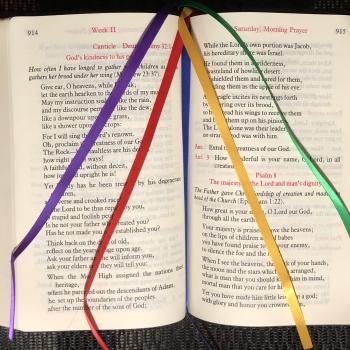What is the relationship between holiness and joy?
A reader named Gordon writes, in response to my concerns about how “experience” can be misunderstood in a spiritual context:
I agree with you that experience is not there for entertainment. But given my background in a very dreary fundamentalist religious upbringing, I always find the word “holy” very off-putting. It connotes too much the grey, dreary community of believers in the movie Babette’s Feast that meet weekly for dreary worship. Can you help me understand the most positive meaning of “holy,” especially the spiritual writers talk about it as the goal of the spiritual journey? I tend to think of it as something opposite to abundant life.

First of all (addressing Gordon directly), I am so sorry that you — like so many others — have been subjected to the long shadow of dreary, miserable religiosity, where holiness is equated with stern self-denial and rigid rejection of all that is joyful and pleasurable. I certainly understand that, given such a background, you might resist the concept of holiness as almost a code-word for spiritual masochism.
I hope you will adopt a “beginner’s mind” perspective here, and consider that the problem is not with holiness, but with how it has been misunderstood over the years.
There is certainly a long history of religious language that seems to equate holiness with the rejection of transitory pleasures. That comes from a basic recognition that even the most sublime of earthly delights will eventually pass away or cease to please us. Only God provides us with ultimate felicity and beatitude.
But — here is where the distortion creeps in — it is a short hop form “no earthly pleasure can ultimately satisfy us” to “no earthly pleasure is worthy of our attention” which then can devolve into “earthly pleasures are no good.” And that leads to the the kind of dour piety that seems to equate happiness with sin and pleasure with evil.
Yet to reject the goodness of life’s pleasures is just as misguided as to place our ultimate hope in them. In fact, in some ways, rejecting earthly pleasure is simply the mirror image of indulging in such pleasure: both positions make the same mistake of placing too much emphasis on transitory delights.
True holiness consists not in rejecting abundant life — nor from indulging in earthly pleasures — but from a place of radical non-attachment. It’s like being able to enjoy an ice cream cone without freaking out once it’s gone. If we become addicted to ice cream, we get anxious when the cone is gone. If we realize we have the capacity to become addicted to ice cream, then we might declare that “eating ice cream is bad”! But both of those positions miss the mark. A happier alternative to either addiction or rejection is to simply enjoy an ice cream cone once in a while, not over-doing it (i.e., make it part of an overall balanced diet) and not getting too worked up if the ice cream shop is closed before you make it there and so tonight you have to do without.
But so many of the saints and mystics do counsel renunciation, you might argue. And you’re right. I think historically, Christian spiritual teachers have been more worried about attachment to pleasure, rather than the corollary problem of addictive rejection of pleasure. But we live in the long shadow of radical Calvinism, Jansenism, Puritanism, those kinds of Christian thinking that over-amplify the rhetoric of renunciation to the point where it truly becomes life-denying rather than life-enhancing.
So in our time, we need to do some course-correcting in the opposite direction.
I do believe that spiritual happiness involves an appropriate measure of simplicity, non-attachment, humility, and mindfulness. But these qualities do not have to be dreary or dour or life-denying. In fact, I think this is an important point of discernment: can I be non-attached to the pleasures of life, while still enjoying my life (which means enjoying those delights that do come my way)? If the answer is no, then there’s work to do. But on the other side, if we are so enmeshed in earthly pleasures that we feel anxiety or distress when we are deprived of them, that’s also a place where something is out of joint.
I think we have to remember that joy is a fruit of the Spirit (Galatians 5:22), second only to love. An essential characteristic of holiness is joy. Melancholy, or dreariness, or puritanism, are not on the list of fruit of the Spirit! So I think we can safely say, “if it’s not joyful, it’s not fully holy.”
So for Gordon (and really, for all of us), I hope we can try to let go of that early childhood programming that insisted God and pleasure don’t mix. Holiness is joyful, delightful, and truly happy. In other words: a holy person enjoys life, delights in life, and is happy in life. But holiness is also non-attached to those things which bring us pleasure, because true holiness seeks to be grounded entirely in God. Which means that a holy person knows how to delay gratification in the service of a higher good, whether that means caring for others, serving those in need, practicing appropriate forms of self-discipline, or even giving our pleasures away to others. But because holiness is such a happy state, even doing these “renunciations” will lead to an even deeper joy.
May we all be delighted by the ever-expanding adventure of joyful sanctity, lavishly and lovingly bestowed upon us through the grace of God.
Enjoy reading this blog?
Click here to become a patron.














